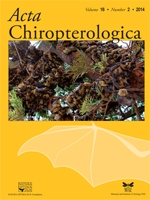Use of torpor likely favors the survival of subtropical bats in harsh environments. The fishing myotis (Myotis vivesi) is a species endemic to desert islands in the Gulf of California, where summers are extremely hot and winters are cold and windy. We explored thermoregulating abilities of M. vivesi measuring skin temperature (Tskin) on free-ranging individuals in winter 2010 and 2011, and in summer 2010. We also measured ambient (Ta) and roost (Troost) temperatures during the study, and we obtained data for wind speed at night time during winter periods. We found that all bats entered torpor in both winters and that at least three individuals hibernated for several days, which had not been reported previously for bats in subtropical deserts. In summer, three individuals entered short bouts of shallow torpor in early mornings. Roosts were slightly warmer than Ta in winter at nightime, and in summer they never reached temperatures > 38.7°C, even at Ta ≈ 45°C. Roost occupancy in winter was higher during windy nights in 2010 but no pattern was found in 2011. Therefore, in winter fishing myotis were more likely to remain in their night roosts and enter torpor when ambient conditions (e.g., strong winds) limit fishing on marine waters. In summer, roosts provide good insulation against high Ta, and bats might not need to resort to torpor to lower their metabolic rate except for a brief period during early mornings. When resources are limited the use of torpor may increase this insular species' chances of survival.
How to translate text using browser tools
1 December 2014
Winter and Summer Torpor in a Free-Ranging Subtropical Desert Bat: The Fishing Myotis (Myotis vivesi)
Valeria B. Salinas R.,
L. Gerardo Herrera M.,
José Juan Flores-Martínez,
Dave S. Johnston
ACCESS THE FULL ARTICLE

Acta Chiropterologica
Vol. 16 • No. 2
December 2014
Vol. 16 • No. 2
December 2014
daily torpor
deserts
fishing bats
Gulf of California
heterothermy
hibernation
Vespertilionidae




